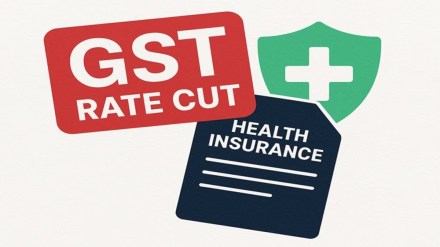As announced after the GST Council meeting earlier this month, the “simplified tax structure” with a majority of items under two slabs of 5% and 18% is in place from today. Several goods and services, including life and health insurance, benefited from the move. Prime Minister Narendra Modi in his address to the nation on the eve of Navratri called the GST relief “savings festival” for the people.
GST on health and life insurance premiums has been reduced to zero. This significant decision was taken at the 56th GST Council meeting and has come into effect from today. Previously, insurance policies were subject to an 18% GST, making insurance more expensive for consumers.
What does this zero GST mean for policyholders?
For example, if a person paid an annual premium of Rs 20,000, it attracted an additional Rs 3,600 in GST, bringing the total cost to Rs 23,600. However, with the recent decision of the GST Council, this entire burden has been removed, and now customers will only have to pay the base premium amount. This simply means that purchasing an insurance policy has become more affordable than ever before, which is also expected to increase insurance coverage among the general public.
Which policies will benefit?
The GST exemption will apply to all individual life and health insurance policies like – term insurance, family floater plans, ULIPs (unit linked insurance plans), health insurance, reinsurance services, etc.
This will provide relief to millions of policyholders, making insurance purchases easier and cheaper than before.
Insurers won’t have input tax credit option to avail now
According to experts, the non-availability of input tax credit (ITC) for insurers is a concern. Until now, when they paid GST on agent commissions, marketing, office rent, or other operational expenses, they could adjust it as input tax credit.
For example:
Suppose a company spent a total of Rs 70 on agent commissions and rent.
On this, 18% GST, or Rs 12.6, was paid to the government.
Previously, the company would deduct this Rs 12.6 from the Rs 18 GST collected from policyholders, and only collect Rs 5.4 in net GST.
Now, since the provision for collecting GST from customers has been abolished, insurance companies will no longer be able to adjust the GST paid on their expenses (such as this Rs 12.6). This means the companies will have to bear this burden themselves.
Will companies increase premiums?
According to a Kotak Institutional Equities report, the loss of input tax credit will result in losses for insurance companies and could force them to increase premiums by 3-5%.
However, since GST has been reduced from 18% to zero, customers will still see actual savings of 12-15%.
The report estimates:
The removal of the 18% GST will immediately reduce premiums.
Companies will increase premiums by 3-5% due to the discontinuation of the ITC.
Net effect: Premiums will still be 12-15% cheaper for customers.
Benefits for insurance policyholders
Direct benefit: Insurance premiums will decrease immediately.
Long-term impact: Insurance will remain cheaper even after companies adjust their tariffs.
Demand will increase: When premiums are lower, more people will be encouraged to purchase insurance. This is likely to increase insurance penetration in India.
Challenges for insurance companies
The discontinuation of the ITC will increase operating costs.
Companies will have to revamp their tariff structures to maintain their margins.
Costs like marketing and agent commissions will further burden consumers.
Expert’s take on GST cut on insurance
Anuj Mathur, MD & CEO, Canara HSBC Life Insurance, said, “By waiving off GST from individual life insurance policies, the government has created a nudge for underserved segments and geographies. This step will encourage long-term coverage in smaller towns, particularly among price-sensitive segments, enabling insurers to widen the safety net and narrow India’s protection gap. The responsibility now lies in ensuring these benefits are delivered through simpler products, supported by clear communication and high-quality service.”
Summing up…
For now, this is extremely positive news for consumers — purchasing insurance policies has become 18% cheaper from today. Yes, companies may increase premiums by 3-5% in the future, as reports suggest; but even then, insurance will still be comparatively cheaper for consumers than before.
